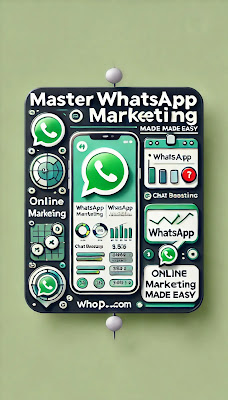By: Russell Johnson.
Title: Unlocking Success: A Comprehensive Guide to WhatsApp Marketing Strategy
Introduction
In today’s fast-paced digital world, direct communication with customers is paramount to staying competitive. WhatsApp, a messaging app with over 2 billion users worldwide, has emerged as a powerful marketing tool. Its versatility, ease of use, and direct customer engagement potential make it a go-to platform for businesses of all sizes. This essay delves into the strategies that can elevate your brand's WhatsApp marketing, ensuring both customer satisfaction and measurable business growth.
Why WhatsApp Marketing?
WhatsApp is more than just a chat app; it is a business enabler that connects brands directly with customers in a personalized manner. Here’s why:
- Global Reach: With billions of active users, your campaigns have the potential to reach a wide audience.
- High Engagement Rates: WhatsApp messages boast an average open rate of over 90%, far exceeding email marketing.
- Cost-Effective: Unlike traditional marketing channels, WhatsApp is affordable and efficient.
- Two-Way Communication: Customers can interact directly with brands, enhancing trust and loyalty.
Building a Winning WhatsApp Marketing Strategy
1. Set Clear Goals
Before diving into WhatsApp marketing, define your objectives. Are you looking to:
- Boost sales?
- Enhance customer service?
- Drive traffic to your website?
- Build brand awareness?
Clear goals will shape your approach and help you measure success effectively.
2. Create a WhatsApp Business Account
The WhatsApp Business app provides features tailored to businesses, such as:
- Business Profile: Add your company name, logo, contact details, and website.
- Quick Replies: Save time with predefined responses to FAQs.
- Catalog Feature: Showcase products or services directly on the app.
3. Build an Engaged Audience
Unlike social media, WhatsApp is a private channel. Building an audience requires consent. Use these strategies:
- Offer Value: Encourage sign-ups by promoting exclusive deals or useful content.
- Website Integration: Add a WhatsApp chat widget or link to your site.
- Social Media Promotions: Share your WhatsApp number across platforms.
4. Segment Your Audience
Segmentation ensures that your messages resonate with the right audience. Divide your contacts based on:
- Demographics (age, location, preferences)
- Purchase history
- Engagement levels
Tools like WhatsApp API allow advanced segmentation, making campaigns highly targeted.
5. Leverage WhatsApp Features
WhatsApp offers a suite of features that enhance marketing efforts:
- Broadcast Lists: Send personalized messages to multiple users at once.
- Status Updates: Post updates that vanish after 24 hours to highlight offers, events, or product launches.
- Rich Media Support: Use images, videos, and links to make your campaigns engaging.
6. Content Strategies for WhatsApp Marketing
Effective content is the backbone of a successful campaign. Ideas include:
- Personalized Offers: Send tailored discounts based on customer preferences.
- Educational Content: Share tips, tutorials, or how-to guides related to your niche.
- Behind-the-Scenes Updates: Build trust by showcasing your team or processes.
- Customer Testimonials: Share success stories to build credibility.
7. Incorporate Automation and Chatbots
Scaling WhatsApp marketing is easier with automation tools. Chatbots can:
- Handle customer queries 24/7.
- Provide instant replies to FAQs.
- Guide users through the purchasing process.
Tools like Twilio, WATI, and WhatsApp Business API make integration seamless.
8. Use WhatsApp for Customer Support
A significant advantage of WhatsApp is its ability to enhance customer support. Tips include:
- Timely Responses: Strive for prompt replies to build trust.
- Feedback Collection: Use WhatsApp to gather customer opinions.
- Proactive Assistance: Notify users about order status, service updates, or appointment reminders.
9. Analyze and Optimize Campaigns
Regular analysis ensures continuous improvement. Track metrics such as:
- Open rates
- Click-through rates
- Conversion rates
- Customer satisfaction scores
Use tools like WhatsApp Business API analytics or integrate with third-party CRM platforms.
Case Studies: Successful WhatsApp Marketing Campaigns
1. KLM Royal Dutch Airlines
KLM uses WhatsApp to provide flight updates, answer customer queries, and share travel tips, setting a benchmark for customer service.
2. Absolut Vodka
Absolut created a buzz by inviting users to an exclusive party through WhatsApp, generating significant brand engagement.
3. Hellmann’s
Hellmann’s leveraged WhatsApp to provide real-time recipe suggestions, showcasing the app's potential for creative engagement.
Common Challenges and How to Overcome Them
1. Privacy Concerns
WhatsApp’s end-to-end encryption ensures secure communication, but always obtain consent before messaging users.
2. Avoiding Spam
Over-messaging can alienate customers. Stick to relevant and value-driven content.
3. Scaling Efforts
Use automation and chatbots to manage large-scale campaigns efficiently.
Conclusion
WhatsApp marketing is an indispensable tool in the digital marketer’s arsenal. By adopting a customer-centric approach and leveraging WhatsApp’s unique features, businesses can create meaningful connections, drive conversions, and achieve lasting success. Start small, test different strategies, and continuously refine your approach to unlock WhatsApp’s full potential.




%20in%20the%20Near%20Future.jpg)
No comments:
Post a Comment